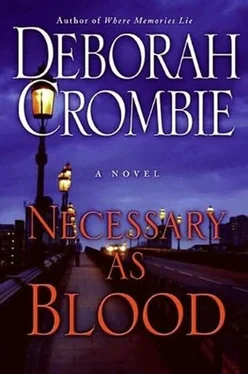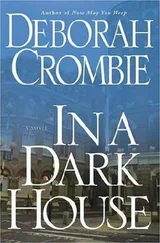Gemma stood, lurching awkwardly on the uneven ground, and spoke before Weller could reply. “Gemma James. Detective inspector, Notting Hill.”
“Bit off your patch,” said the pathologist, looking interested.
Weller didn’t offer an explanation. “Inspector James, this is Dr. Rashid Kaleem, esteemed Home Office pathologist and local wiseass.”
There were a dozen or so accredited Home Office pathologists practicing in Greater London and the southeast, many of whom Gemma had met in the course of her work both at the Yard and at Notting Hill. But if Kaleem were new to the service, he and Weller appeared to have an established relationship, and in spite of the banter it seemed friendly enough.
Gemma made way for Kaleem, trying to retrace exactly her steps back to the path.
Kaleem worked efficiently, snapping photos with his own digital camera, murmuring observations into a pocket recorder as he conducted his external examination. He then eased up the tail of Naz Malik’s polo shirt to insert his temperature probe, and Gemma looked away from the sight of Malik’s exposed back. It was somehow worse than blood or a wound, that expanse of smooth, bare skin.
A shaft of sunlight penetrated the trees, burning Gemma’s bare shoulder, and she realized she had forgotten to put on sunscreen. Shifting position slightly, she watched as Kaleem took more close-ups of Malik’s head. Then, without asking for help, he gently turned the body over.
“Lividity is fixed,” he said. “I don’t think he was moved. What time was he last seen yesterday?”
When Weller looked at Gemma, she answered, “He left his house around two yesterday afternoon. That’s the last confirmed report.”
Kaleem shook his head. “Rigor mortis is still fully developed. There are other factors, of course, but in this heat, if he’d been dead almost twenty-fours hours, I’d expect it to be passing off.”
“If he died before sunset, it’s likely someone would have seen the body last night,” Weller said, frowning. “Although the park stays open till half past nine this time of year, so it would have been fully dark by closing-”
“He might have been here for some time before he died-perhaps between the park closing and the early hours of the morning.” Kaleem put the last of his things into his kit and stood up. “I’ll know more when I get him on the table.”
Weller didn’t seem ready to end the discussion. “If he took drugs, then came here to die, or if he took the drugs here-”
“You’re assuming this was a suicide, Inspector?” Kaleem’s voice was sharp.
“The man’s wife went missing three months ago,” Weller explained. “He had reason enough, especially if he was involved in her disappearance-”
“Regardless of the victim’s personal circumstances,” broke in Kaleem, “if this was suicide I’d say this man had an odd sort of assistance.”
Weller stared at him. “What are you talking about, Rashid?”
“I’ve been doing this job for ten years, Inspector, and I’ve never seen a person fall with their head in that position. Even if this man was dead when he fell, the impact would have turned his head to one side or the other. I’d guess this man died of suffocation, regardless of any other incapacitating factors.”
Weller looked at him blankly. “Suffocation?”
“His breathing would have been severely restricted by the position of his head.” Dr. Kaleem glanced at Gemma, as if expecting an ally. “And I’d wager you that someone made quite sure it stayed that way.”
There was a strong sense of an artists’ community at that time in Brick Lane. The rich and famous were yet to move in, the streets still felt like unexplored territory and it was possible to survive financially in the area on very little.
– Rachel Lichtenstein, On Brick Lane
Dr. Kaleem had released the body and ordered it to be sent to the mortuary at the London. “I’ll see how soon I can get him into my schedule,” he told Weller as they walked back towards the street.
“You can put any old ladies eaten by cats in the cooler for a bit,” Weller told him, clapping him on the shoulder.
“I do have my priorities, Inspector, thanks very much,” Kaleem retorted. “I’ll ring you as soon as I have a prelim.” Then he flashed Gemma a brilliant smile and jogged across Audrey Street. He slipped through the police cordon, bag swinging, and disappeared from view.
“You two know each other well?” Gemma asked Weller, wondering at the barbed familiarity of the exchange.
“Snotty-nosed little Bangladeshi from a council estate,” said Weller, gazing after him. “I used to sort out the kids who bullied him when I was on area patrol. Gave him ideas above his station.” This was uttered fondly, and with the closest thing to a smile Gemma had seen. “Who’d have thought he’d end up a bloody forensic pathologist? His father beat the crap out of him if he caught him with a book, and his mum never learned to speak English. Rashid practically lived in the Whitechapel Library-the Idea Store, they call it now,” he added with a snort of disapproval, “and put himself through medical school driving a minicab. Bet his old man’s turning in his grave.”
“Why didn’t his father want him to read?”
“Strict Muslim. Thought anything other than the Koran would corrupt the boy. Right bastard, old Mr. Kaleem. I suspect the missus gave thanks to Allah when he died. Heart attack. Keeled over right in the middle of his dinner.” Weller stuffed his hands in his already baggy pockets and shrugged. “Rashid was surprisingly cut up.”
Gemma wondered if it had been Weller who’d informed Kaleem that his father had died. Then the enormity of what she had to do struck her. “Oh, lord. I’ve got to tell Tim. And we’ll have to ring social services. There’s no one for Naz Malik’s little girl to go home to.”
Weller had said he’d follow Gemma in his own car, leaving Gemma grateful for a few minutes alone. Her Escort had been parked in the sun, and she swore as the driver’s seat scorched the backs of her thighs through her jeans. She rolled down the windows and started the car. Hot air blasted from the vents into her already-burning face as she carefully reversed and turned the car round.
She debated ringing Kincaid, but didn’t want to talk without pulling over, and DI Weller, in an old white BMW that looked as rumpled as Weller himself, stayed right on her tail.
All too soon she’d reached Islington, and still she had no idea how to break the news to Tim. Death notification was always difficult, but telling a friend was so much worse…She realized that the last time she’d had to break such news to someone she knew well, it had been Hazel.
It felt odd now, pulling up in front of the detached house in the leafy square, rather than turning into the side road and parking in front of the garage that had been her flat. Last night, in a hurry to get home, she had handed Tim the keys at the door. She hadn’t actually been in the house since Hazel had moved out. Although they had kept up with Tim, he had come to them, or they had occasionally met him out for a drink or a meal.
Then, to her surprise, she saw Hazel’s car parked in front as well, and after yesterday’s tensions she wasn’t sure if her friend’s presence would be a help or a hindrance.
Weller found a spot nearby and got out of the BMW, closing the door as carefully as if it had been the newest model. He looked tired, and she realized he must have driven back from Shropshire that morning. Perhaps his rumpled look was more circumstantial than habitual.
When he reached her, he nodded back at his car, and she felt embarrassed that he’d seen her studying it. “Putting two kids through uni doesn’t leave much for upgrading the old wheels,” he said, as if in apology. “And besides, they don’t make the Beamers the way they used to. I’ve got quite fond of the old girl.” He looked up at the house. “This your friend’s? Not bad digs.”
Читать дальше












